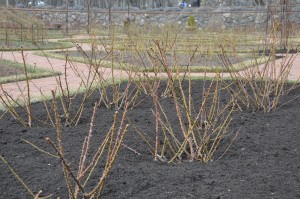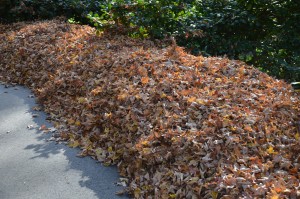In autumn the cool crisp air paints the land with a colorful array from tree and shrub foliage. As days turn into weeks, leaves fall away and pile up on rooftops, walkways, lawns and gardens. Instead of just raking and tossing them curbside, gather and put them to good use.
Fallen leaves (and grass clippings) can be easily composted, turned into “black gold” and spread as leaf mulch over garden soils or around trees and shrubs, including roses. Leaf mold enriches the soil, locks in moisture, and protects plant crowns and roots from the frigid winter temperatures. You save money by not buying bagged mulch or compost at garden centers.
To speed the composting process, shred leaves and small twigs and branches with a mulching mower, shredder or leaf blower set on vacuum setting. Start with a thin layer of shredded leaves to compost. It decomposes rapidly, usually within a few months. Small twigs and branches decompose more rapidly. Heaping up thick heavy layers garden debris will block air and water from penetrating the pile.
Leaf mold (sometimes spelled mould) is essentially a soil conditioner. It improves soil water retention and soil structure, and creates a living habitat for beneficial organisms such as earthworms and bacteria that nourish the soil.
Distribute only a few inches of leaf mold. Thick layers of composted mulch locks in too much moisture, and smother plant roots that require well-drained soil. Roots become susceptible to rots and other fungal diseases.
The decomposition process for leaves takes at least 6-12 months. It takes very little work on the gardener’s part. To speed up decomposition, mow over the piled leaves once or twice. A few handfuls of nitrogen-rich fertilizer will speed up the rotting process. Turn the pile with garden fork or heavy rake to aerate. Throw a plastic tarp over the pile to keep leaves warm and moist.
Add leftover leaf mold to a compost bin or store remains in plastic bags for later use.



 Posted in
Posted in 
